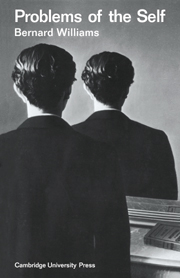Book contents
- Frontmatter
- Contents
- Dedication
- Preface
- 1 Personal identity and individuation
- 2 Bodily continuity and personal identity
- 3 Imagination and the self
- 4 The self and the future
- 5 Are persons bodies?
- 6 The Makropulos case: reflections on the tedium of immortality
- 7 Strawson on individuals
- 8 Knowledge and meaning in the philosophy of mind
- 9 Deciding to believe
- 10 Imperative inference
- 11 Ethical consistency
- 12 Consistency and realism
- 13 Morality and the emotions
- 14 The idea of equality
- 15 Egoism and altruism
- Bibliography
- Index of names
6 - The Makropulos case: reflections on the tedium of immortality
Published online by Cambridge University Press: 07 December 2009
- Frontmatter
- Contents
- Dedication
- Preface
- 1 Personal identity and individuation
- 2 Bodily continuity and personal identity
- 3 Imagination and the self
- 4 The self and the future
- 5 Are persons bodies?
- 6 The Makropulos case: reflections on the tedium of immortality
- 7 Strawson on individuals
- 8 Knowledge and meaning in the philosophy of mind
- 9 Deciding to believe
- 10 Imperative inference
- 11 Ethical consistency
- 12 Consistency and realism
- 13 Morality and the emotions
- 14 The idea of equality
- 15 Egoism and altruism
- Bibliography
- Index of names
Summary
This essay started life as a lecture in a series ‘on the immortality of the soul or kindred spiritual subject’. My kindred spiritual subject is, one might say, the mortality of the soul. Those among previous lecturers who were philosophers tended, I think, to discuss the question whether we are immortal; that is not my subject, but rather what a good thing it is that we are not. Immortality, or a state without death, would be meaningless, I shall suggest; so, in a sense, death gives the meaning to life. That does not mean that we should not fear death (whatever force that injunction might be taken to have, anyway). Indeed, there are several very different ways in which it could be true at once that death gave the meaning to life and that death was, other things being equal, something to be feared. Some existentialists, for instance, seem to have said that death was what gave meaning to life, if anything did, just because it was the fear of death that gave meaning to life; I shall not follow them. I shall rather pursue the idea that from facts about human desire and happiness and what a human life is, it follows both that immortality would be, where conceivable at all, intolerable, and that (other things being equal) death is reasonably regarded as an evil.
- Type
- Chapter
- Information
- Problems of the SelfPhilosophical Papers 1956–1972, pp. 82 - 100Publisher: Cambridge University PressPrint publication year: 1973
- 124
- Cited by



